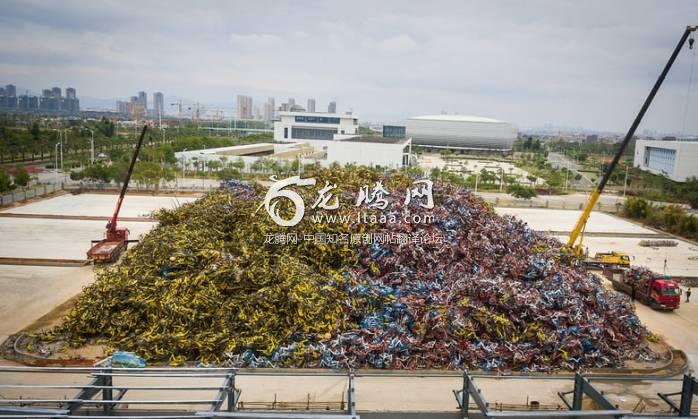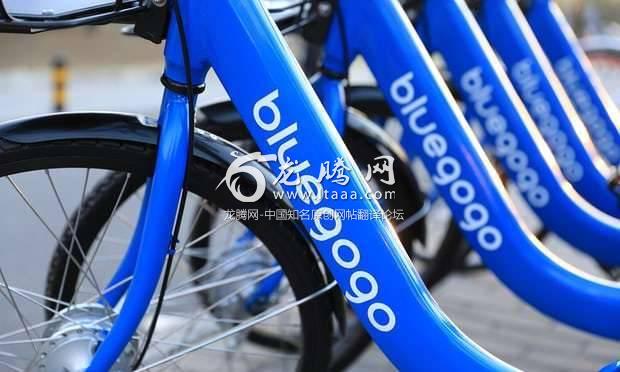中国共享单车垃圾场是对产业“自大”的纪念碑 [英国媒体]
一眼看上去,这张照片模模糊糊的像一幅画。仔细观察,它可能是一个巨大的雕塑或是什么其他的艺术项目。但实际上,这是一座废弃自行车累积成的山堆,它的面积有如此之大:直有足球场大小;它的高度有如此之大:起重机要完全展开才能触及顶部。但所有这些都被遗弃,由于中国共享单车的兴起与崩溃。
At first glance the photos vaguely resemble a painting. On closer inspection it might be a giant sculpture or some other art project. But in reality it is a mangled pile of bicycles covering an area roughly the size of a football pitch, and so high that cranes are need to reach the top; cast-offs from the boom and bust of China’s bike sharing industry.
一眼看上去,这张照片模模糊糊的像一幅画。仔细观察,它可能是一个巨大的雕塑或是什么其他的艺术项目。但实际上,这是一座废弃自行车累积成的山堆,它的面积有如此之大:直有足球场大小;它的高度有如此之大:起重机要完全展开才能触及顶部。但所有这些都被遗弃,由于中国共享单车的兴起与崩溃。
Just two days after China’s number three bike sharing company went bankrupt, a photographer in the south-eastern city of Xiamen captured a bicycle graveyard where thousands have been laid to rest. The pile clearly contains thousands of bikes from each of the top three companies, Mobike, Ofo and the now-defunct Bluegogo.
就在中国第三大共享单车公司破产两天后,东南沿海城市厦门的一位摄影师拍下了一处自行车坟场,成千上万辆自行车被放置在那里。这座自行车堆中的自行车显然来自于行业排名前三的三家公司:摩拜,OFO,和现已不复存在的小蓝单车。
Once hailed as “Uber for bikes”, China’s cycle hire startups allowed users to unlock GPS-enabled bikes with their smartphone, and drop them off anywhere without the need to park it at a dock.
曾经被誉为“自行车优步”的中国自行车租赁公司允许用户使用智能手机解锁带有gps功能的自行车,并将其停放到任何地方,不需要停车桩。
Bluegogo’s bankruptcy last week sparked questions about the future of dockless bike sharing in China, amid concerns there are too many bikes and insufficient demand. In an open letter apologising for his missteps, Bluegogo’s chief executive said he had been “filled with arrogance”.
上周,小蓝单车的破产引发了人们对中国“无桩共享单车”未来的质疑,因为人们担心自行车的数量太多而需求不足。小蓝单车的首席执行官在一封公开信中为他的失误道歉,称自己“充满了傲慢”。
Customers are charged just pennies per 30 minute ride, but competing companies have flooded cities with bikes to ensure cycles are always available. The top two firms have each raised more than $1bn (£750m) in funding.
共享单车的用户骑行30分钟只要几便士,但是竞争激烈的共享单车公司已经用自行车淹没了城市,以确保自行车随手可得。排名前2的两家公司已经筹集了超过10亿人民币(7500万英镑)的资金。
Shanghai currently has 1.5m shared bikes on the streets, and despite its population being three times greater than London, that number far outstrips the 11,000 Santander Cycles peppered throughout the UK capital.
上海目前有150万辆共享单车,尽管其人口是伦敦的三倍,但这一数字毕竟远远超过了遍布伦敦桑坦德自行车11000辆的规模。
The large number of cycles on Chinese streets have led to scenes of clogged sidewalks no longer fit for pedestrians and piles of mangled bikes that have been illegally parked.
在中国的街道上,大量的自行车已经导致人行道瘫痪,不再适宜行人。遭废弃的自行车也被非法的堆放着。
But the scene in Xiamen appears to be one of the largest amalgamations of discarded bicycles, with trucks unloading bikes from around the city.
但发生在厦门的这一场景似乎是废弃自行车中最大的一坨,卡车将全城的自行车都卸载到此地。
Chris Farouk Hussain 1d ago
I've been living in China since August - working as an Economics Lecturer at CSUFT - and recently paid deposits for two of these bike shares: OFO and Mobike. A couple of points - the idea is fine, and living in Changsha (pop. 7m+) it works absolutely fine. It's very convenient as they have a bike locator as well so even if you're not coming out of the subway* and there are not bike hotspots, you can find one using the locator. But there is an obvious problem - too many suppliers. My experience of the two I've paid deposits to use:
- Mobike, which is very reliable, are not always available in certain parts of the city.
- OFO, which appears to be everywhere, have cheap bikes and frequently out of order
Then there are many other companies, at least three that I can remember. I suspect each has a deposit to pay. The cost of using one bike is in pence, and that's for an hour I believe. I think this would work much better if it was one accountable company. The demand isn't that high anyway as the Chinese love their cars and the buses and subways are great anyway - the main function of the bike for me is getting to the bus stop from the campus. So demand is elastic and the dangers of the monopolist do not apply here.
So the idea is fine, but, as is often the case, execution is flawed and needs tweaking.
*Subway in Changsha is really impressive - 60p to go 20km across town.
我从八月起就一直住在中国,在中南林业科技大学担任经济学讲师,最近我给OFO和摩拜交了押金。下面是我的一点感想:
这个主意(共享单车)不错,然后在长沙这个城市(人口700万+)执行的也不错。使用非常方便,因为它们的自行车可以定位。哪怕你不是从地铁口出来,也不在自行车投放区,也能凭借定位功能找到自行车。但是有一个明显的问题——供应太多了。
我在摩拜和OFO这两家的体验是:
-摩拜,非常可靠,不过在某些地方找不到自行车。
-OFO,到处都是,拥有的是廉价的自行车,而且损坏情况比较普遍。
还有其他的几家公司,我记得至少还有三家。可能每一家公司都有用户。骑行成本非常便宜,以分,角来计。如果它们是一家更有责任感的公司,我相信运行情况会更好。不过无论如何,(对共享单车的)需求没有那么高,因为中国人喜欢他们的汽车,公交车和地铁的运行情况也不错——我骑共享单车的主要功能就是去学校的公共汽车站。因此,需求弹性很大,对垄断情况的担忧在这里并不适用。
所以说,这个想法很好。但是,通常情况下,执行有一些缺陷,需要调整。
*长沙的地铁令人印象深刻——在市区乘坐20公里,只需要60便士。
imipak
Hurrah for laissez-faire capitalism! No need for regulation or government intervention, the efficient market will achieve equilibrium all on its own with zero social costs!
为自由放任的资本主义喝彩!不需要监管,也不需要政府干预,高效的市场不需要成本就能达到平衡!(译注:讽刺意味)
Guardian Pick
"Stock 'em high, sell 'em cheap" is hardly a concept of Chinese origins. Most of the disasters in the U.S. economy have been based on this idea.
(Amazon isn't a disaster for Amazon, but it is a disaster for fair competition, fair trade and quality control.)
That it's failing now in bike rentals just proves that sustainable ideas require quality not quantity.
“追涨杀跌”很难说是中国的概念。美国的数场经济危机都是因为这个概念而造成的。
(亚马逊大涨不是亚马逊的灾难,但却是公平竞争、公平贸易和质量控制的灾难。)
如今自行车租赁的失败证明了可持续理念需要质量而不是数量。
goldilockess
The biggest problem with designated city biking is Grooming. You turn up at "B" with very wet socks, wet down the neck, sweaty through non breathing waterproof, grimey and dishevelled just ready for the interview of your lifeor impressing someone.
在城市骑自行车最大的问题出在个人形象上。当你骑车到达目的地时,袜子非常潮湿,脖子湿漉漉的,不透气的防水面料让你大汗淋漓,浑身凌乱。你能指望用这身打扮去参见面试给某人留下深刻的印象吗。
afs100
I have never quite understood how these schemes are supposed to make money.
What is the true cost of one of these bikes?
What is the business plan?
I read somewhere that the sign up fee alone would make it profitable but that doesn’t sound right.
Does anyone know ?
我从来不能理解这些计划是怎么赚钱的。
这些自行车真正的成本是多少?
商业计划是什么?
我曾经读到说,哪怕仅仅用押金,这个计划就有利可图。但是这听起来并不正确。
有人知道么?
ianrob2
Living in Shanghai, these bikes have caused a major nuisance, blocking streets and entrances to tranportation. Supply/demand is way out of control.
Regarding pricing, the business model is, like Google etc, once again data mining. Knowing who travels from A to B at what time is valuable information which can be sold on. These data are apparently far more valuable than the rental fees.
我就生活在上海,这些自行车造成了严重的妨害,阻塞了街道和入口。供应/需求关系已经失去控制。
至于它们是如何赚钱的,这个商业模型是,像谷歌那样,他们对数据进行挖掘。知道谁从A到B是可以出售的宝贵信息。这些数据显然比租金更有价值。
版权声明
我们致力于传递世界各地老百姓最真实、最直接、最详尽的对中国的看法
【版权与免责声明】如发现内容存在版权问题,烦请提供相关信息发邮件,
我们将及时沟通与处理。本站内容除非来源注明五毛网,否则均为网友转载,涉及言论、版权与本站无关。
本文仅代表作者观点,不代表本站立场。
本文来自网络,如有侵权及时联系本网站。
图文文章RECOMMEND
热门文章HOT NEWS
-
1
最近,新冠肺炎疫情在日本有扩大的趋势,有专家呼吁日本应当举国行动起来,共...
- 2
- 3
- 4
- 5
- 6
- 7
- 8
- 9
- 10
推荐文章HOT NEWS
-
1
最近,新冠肺炎疫情在日本有扩大的趋势,有专家呼吁日本应当举国行动起来,共...
- 2
- 3
- 4
- 5
- 6
- 7
- 8
- 9
- 10












